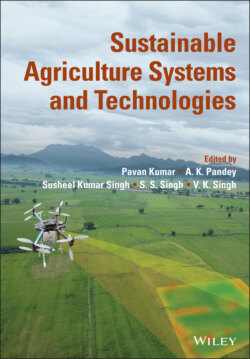Читать книгу Sustainable Agriculture Systems and Technologies - Группа авторов - Страница 58
4.6 Impact on the Economy of Indian Farmers
ОглавлениеThe Ministry of Health and Family Welfare has confirmed a total of 15 500 active cases of COVID‐19 with 592 cases of death in India by 21 April 2020 (www.mohfw.gov.in). The Prime Minister of India has already declared a nationwide “lockdown” on 24 March 2020 and now extended till 03 May 2020 (Phase 1: 25 March 2020–14 April 2020 [21 days] and Phase 2: 15 April 2020–3 May 2020 [19 days]). This lockdown has definitely impacted the farmers and farming operations because it coincides with the harvesting period of Rabi crops in the month of April/May 2020. The agricultural sector of India is encountering serious issues in hiring laborers. Since agriculture produce is an essential commodity, it is exempted from the directives of this lockdown, which is creating many problems to this sector, i.e. cutting and harvesting of rabi crops, other seeds and pulses, main associated issues storage and sale of crop in the mandi markets (Varshney et al. 2020b). The Indian agricultural sector, which suffered recently due to an uneven rainfall, is facing another hit due to disruption in activities as a consequence of the lockdown ensuing from the outbreak of COVID‐19, because the harvesting season for Rabi crops is progressing rapidly, raising concerns regarding the management of matured crops by the farmers. However, the Ministry of Agriculture and Farmers' Welfare and Indian Council of Agricultural Research (ICAR) have released advisories involving crop, livestock, horticulture, and related enterprises in the wake of COVID‐19 spread and, accordingly, practices specific to the state have been also suggested, considering the current situation. Experts of Krishi Vigran Kendras (KVKs) of the state have also circulated these advisories further among the farmers through mobile messaging, WhatsApp, and other interventions through the use of social sites. So far, in the state of Uttar Pradesh, a total of 679 related messages and advisories have been circulated by the KVK experts using Kisan Call Centers (Varshney et al. 2020a), mKISAN, and WhatsApp benefitting approximately 65 thousand, 4.20 lakh, and 49 thousand farmers, respectively.
With an increase in the severity of the global pandemic and subsequent rise in the cost of human life due to SARS‐CoV‐2, outbreak of the novel COVID‐19 is adversely impacting the world economy (Kumar et al. 2020). India has been severely impacted by the SARS‐CoV‐2 outbreak (Singh et al. 2020), thus magnifying the preexisting risk to its outlook. However in the next kharif season agriculture practices are impacted due to nonavailability of agro‐based economy, storage and prevailing state of COVID‐19 disease (Kumar et al. 2020). The agricultural sector has been adversely affected due to the lockdown ensuing from the outbreak of COVID‐19. This nationwide lockdown has impacted the economic system. The World Bank, in its South Asia Economic update report, while assessing the impact of the COVID‐19 outbreak, has estimated the Indian economy to decelerate to 4.8% in 2020 and projected a sharp growth deceleration to 2.8% in a baseline scenario in fiscal 2021.
Although it is evident that farming is the only essential occupation, which can combat the food and livestock needs, some states in India, namely Punjab and Haryana, which are known as the “food bowls” of the country, are encountering major distress. The prime issues include appropriate operating of the machinery required for harvesting and threshing, winnowing, packaging, and transportation of the Rabi crop. Complete interruption of services has rendered the farmers more skeptical of their fate. Permission from the Government to harvest Rabi crops through the process of machine harvesting has encouraged the farmers. The implementation of the COVID‐19 emergency response and health system preparedness package has been planned by the state government in Phase 1, 2, and 3. The center has funded a five‐year scheme worth INR 15 000 crores to strengthen the nation and state level systems as the country is combating to control the infectious SARS‐CoV‐2.
